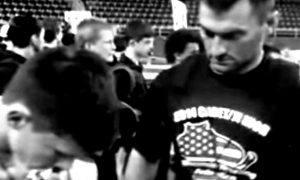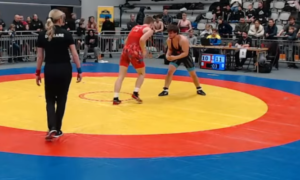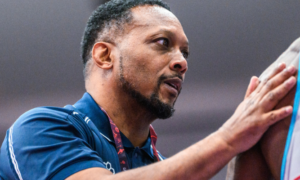Just as this current 2022-23 season had begun to unfold, the expectation (or rather, hope) was that 87 kilograms in the United States would regain its status as the nation’s top upper-weight category. An extensive exploration complete with individual athlete analysis was conducted to this effect, due primarily to the circumstances. For when the ’22-’23 campaign ends, it will do so at a World Championships event that offers the first opportunity for athletes to qualify weight classes on behalf of their countries in advance of the ’24 Paris Olympics.
Across the globe, this is the most important objective at the moment. While national federations in Europe and Asia have attached a requisite degree of significance to their respective continental championships, qualifying weights for the Olympics stands as the highest priority, that is until the time arrives to directly prepare for the actual Olympiad. This is precisely why observers throughout the sport are already witnessing (and have been since Belgrade ’22) droves of top wrestlers move from non-Olympic to Olympic weight classes. In the United States, the goals are, apparently, different. At least they are this time around in what is known as a “qualifying year”. The US program may indeed desire to make eligible all six weight categories for Paris ’24; but if it does, that message has not reached the athlete base loudly and clearly.
Which circles once again back to 87 kilograms in America, a bracket led by reigning two-time World Team member Alan Vera (NYAC), and one that has the participation potential to become the nation’s most robust. Vera is of course registered for the impending US Open, as is John Stefanowicz (Navy WC), who represented the flag at the ’20 Tokyo Games. Rich Carlson (Minnesota Storm) and Timothy Young (Army/WCAP) are likewise on the list, too. The bad news: of the nine wrestlers who were highlighted in December’s deep dive into the weight category, it is just those four.
The good news: one athlete who went unmentioned in the December piece is registered for the Open in this weight category, and despite some time away from Greco-Roman competition, he very well might hold the ability to reshape the optics accordingly. His name is Zac Braunagel (IRTC).
Braunagel (and whose twin brother Danny is also a tremendous wrestler) was a Fargo National champ in ’18 before making the US Junior World Team one year later. An outstanding high school career that was punctuated by two Illinois state titles then helped escort Braunagel to Division I University of Illinois — for whom he has thus far secured entry in three NCAA National Championships (in ’20, his first year, the annual NCAA spectacle was cancelled due to the pandemic). Braunagel’s most recent Greco showing also happened to be his first on the Senior circuit. At the inaugural “Coralville Nationals” that re-opened the doors for competitors in October of ’20, Braunagel placed a highly-respectable third behind Vera and Joe Rau (TMWC).
But Why?
An athlete who has not wrestled a Greco-Roman match in two-and-a-half years, and has but one Senior tournament under his belt, would not normally attract much attention. And certainly, Braunagel, 22, is not being positioned to win the US Open two weeks from now. His bar is high, but maybe not that high. Yet.
Except, such elucidations miss the point. Braunagel, just by residing in the bracket, will be a difference-maker. He is going to impact the result, in some form or fashion, while simultaneously providing all involved with someone else about whom to think whenever thoughts of the World Team Trials, and especially the ’24 Olympic Trials after it, commandeer their brainwaves.
Braunagel, outside of his folkstyle skill-set, has portrayed an innate and authentic feel for Greco-Roman that surpasses the majority of full-time Seniors. It has been this way dating back to when he began to garner notice as an age-group competitor. Moreover, it is not necessarily what Braunagel does well as to why he is a threat. Instead, it is in the lack of deficiencies compared to many of his American contemporaries. Braunagel earnestly endeavors to fight for stout positioning, and then uncompromisingly retains said position; has a (naturally) strong center of gravity; is explosive without becoming overzealous; and the idea of him tiring is almost laughable.
These are not strengths. All of the attributes above are and should be considered standard for athletes with designs on competing at the highest available level. Braunagel rings each bell just by signing his name.
Perhaps plenty of work is still to be done. If you were to speak with his coach, Bryan Medlin, surely ruminations may arise upon wrinkles in need of addressing. Par terre matters, after all, and weaknesses in that area, offensively or defensively, are often exploited. But that is the same for everyone. It is a tired topic these days, right along with how US officials struggle with enforcing passivity guidelines at marquee domestic events.
Of which you should be convinced is not at all worn subject fodder. Whether or not 87 kilograms at the upcoming US Open is disappointing with regards to the number of contestants, Braunagel’s re-assimilation is a most encouraging development. Though the anticipation is that he will put forth a sincere, effective performance, just remember that there is more on the way, and that everyone will be paying even more attention the next time.

Listen to “5PM52: Two-Time Olympian Jim Gruenwald” on Spreaker.
Listen to “5PM51: Lining up with Tanner Farmer” on Spreaker.
SUBSCRIBE TO THE FIVE POINT MOVE PODCAST
iTunes | Stitcher | Spreaker | Google Play Music




















